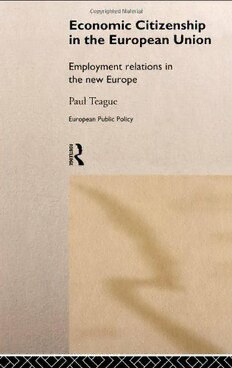
Economic Citizenship in the European Union: Employment Relations in the New Europe (Routledge Research in European Public Policy, 8) PDF
208 Pages·1999·1.558 MB·English
Most books are stored in the elastic cloud where traffic is expensive. For this reason, we have a limit on daily download.
Preview Economic Citizenship in the European Union: Employment Relations in the New Europe (Routledge Research in European Public Policy, 8)
Description:
Paul Teague explores the macro-economic, productive and institutional pressures faced by Europe's social model and assesses a number of economic and political programmes aimed at resolving the crisis. It also considers the role of the European Union building a social dimension to the European economy. The findings suggest that the future of traditional institutions of Social Europe is under threat. However, they also stress that we are not on the threshold of the 'Americanisation' of European life. This study finds that the influential political forces that reject the dismantling of Europe's social model should not be preoccupied with defending inherited institutions. Instead this book argues that they should encourage the construction of new forms of social solidarity compatible with the complexities of modern economic life.
See more
The list of books you might like
Most books are stored in the elastic cloud where traffic is expensive. For this reason, we have a limit on daily download.
